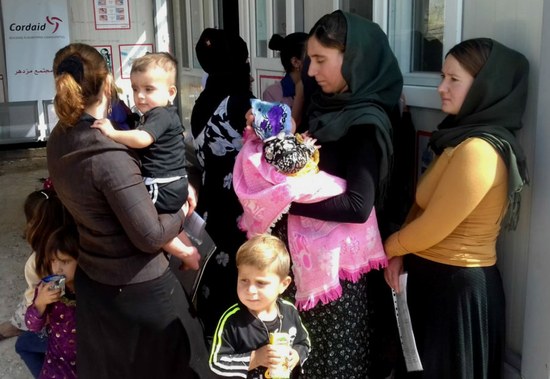 Cordaid, October 2018. Cordaid recently started providing psychosocial support to displaced families in Northern Iraq. “Only now, after ISIL and after having found refuge, do psychological and psychiatric problems come to the surface”, says Hala Saba Jameel, Cordaid’s Health program manager in Northern Iraq.
Cordaid, October 2018. Cordaid recently started providing psychosocial support to displaced families in Northern Iraq. “Only now, after ISIL and after having found refuge, do psychological and psychiatric problems come to the surface”, says Hala Saba Jameel, Cordaid’s Health program manager in Northern Iraq.
You escaped ISIL and its trail of atrocities. You, and your near ones who survived, found refuge in a place which is a 4 hours drive away from your hometown, Sinjar. The last couple of years, you tried to go back several times. Only to see that your home is still uninhabitable or gone. That the area is still insecure and nearly no one has returned. Income opportunities are non-existent. Your kids can’t grow up here.
This is the typical situation of the thousands of Yazidi people that fled to Seje, a village in Kurdistan Iraq, not far from the city of Duhok. Many of them are squatting in unfinished buildings.
A year and a half ago, Cordaid started providing essential health care services to the large community of displaced families and the host population. It is part of Cordaid’s health program in Northern Iraq.
We knew that on top of medical care, the displaced Yazidi population needed mental care and psychosocial support. We knew that all the displaced in Seje – women, children and men – had experienced or narrowly escaped a series of deeply traumatic events. The ISIL siege of Sinjar in 2014. The Sinjar massacre of 2000 Yazidi people. Yazidi women and girls being forced into ISIL slavery. The exodus and hibernation on Mount Sinjar of thousands of refugees. The subsequent battle for the hometown of the Yazidi community.
This is why, since August, Cordaid added a component of psychosocial support in it’s primary health care center in Seje. Hala Saba Jameel, Cordaid’s Health program manager in Northern Iraq, recruited a social worker who fits the job. “She is a Yazidi from Sinjar herself”, Hala explains, “knows what the displaced went through and speaks the same language. For a social worker that is essential.”
Hala herself, an expert in matters of gender based violence, taught the social worker to have a keen eye – and ear – for cases of abuse and harassment among the women and children that visit her.
Read more:
